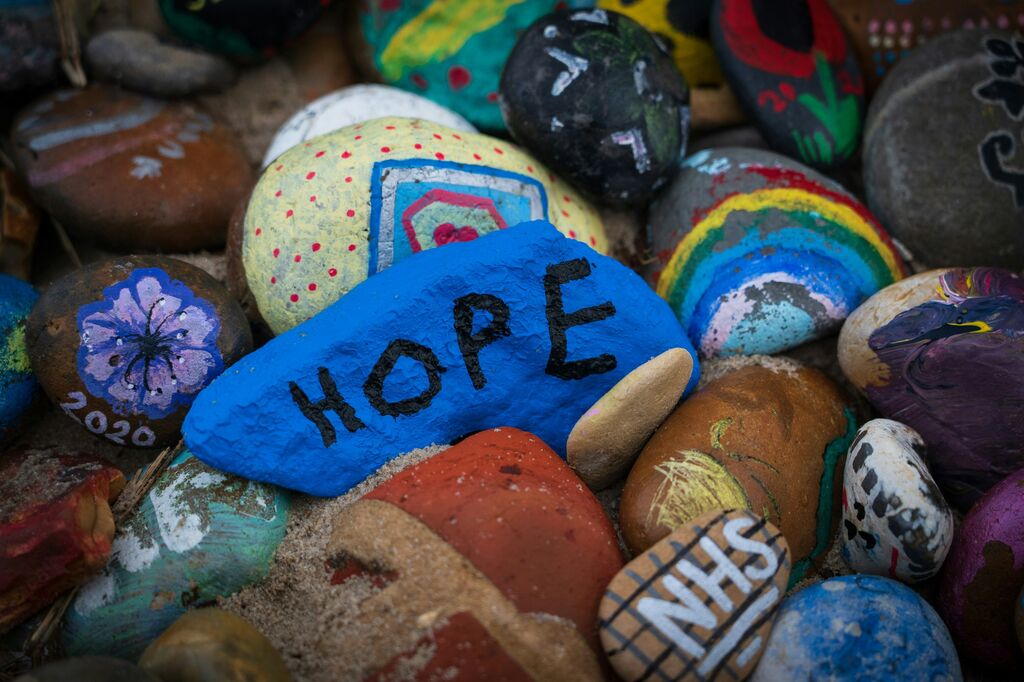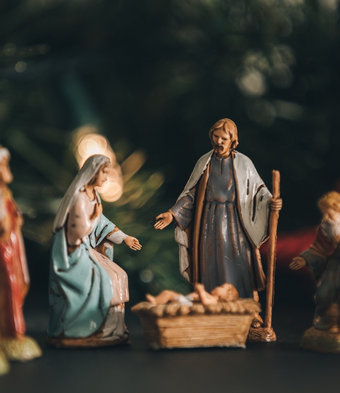Project Hope?

I’ve never really understood the hype around New Year celebrations. I do understand that sometimes - and maybe this was the case in recent years as we walked through the pandemic - it can feel like a fresh start, a blank piece of paper waiting to be written. But as I put it to someone the other day, ‘What happens if I quite liked the old year?!’ Perhaps I’m just an outlier; for millions, both in the UK and around the world, the New Year was again marked by fireworks, parties and Jools Holland’s Hootenanny.
It’s the time of year where we all think about new hopes, dreams and resolutions. And politicians are no different to the rest of us. Last year, the news was dominated by Rishi Sunak’s five pledges. This time - in a mark of the shifting of the strength of their political parties - it was Keir Starmer who was foregrounded. And in an election year, many will see this as a time for hope; after what can only be described as an utter shambles of a term by the Conservatives (even in unusual circumstances), many are ready for a change of government, with Labour currently outperforming the Tories in the polls by 43-25.
All governments tend to stagnate after being in power for too long (the Conservatives are now entering their fourteenth year, having won four consecutive elections), and voters grow tired of them, particularly when the times are bad. Of course, Sir Keir - given his position of strength - is calling for an early election (calling the Prime Minister “a squatter in Downing Street”), and of course, Rishi Sunak seemed (although didn’t firmly promise) to rule out such an election, recognising that he needs to give himself as long as possible to turn things around, with inflation and the numbers crossing the channel both beginning to drop.
Hope was very much the theme of Keir Starmer’s speech: “If you’ve been serving our country, whether in scrubs or the uniform of your regiment and what you want now is a politics that serves you, then make no mistake - this is your year. The opportunity to shape our country’s future rests in your hands. And that is a new year message of hope: the hope of democracy, the power of the vote, and the potential for national renewal.”
But if that all sounds too good to be true (“national renewal” is a pretty formidable task!), maybe it’s because it is…
In previous columns, I’ve been pretty critical of this iteration of the Conservative Party, without offering much comment on Labour. In part, that is because it’s much easier to see how the Conservative Party are actually performing; and Labour have the easy (albeit frustrating!!) job, able to make pledges without being currently held to them.
But what do we actually have to hope in from a potential Labour government? So far, their messages has been little beyond ‘Not the Conservatives’. That message will - after three Prime Ministers in one term of government, bitter infighting between different factions, and endless scandals - almost certainly be enough to get them in government.
But then they will inherit all the problems the Conservatives had. At the last change of government in 2010, Liam Byrne, the Chief Secretary to the Treasury under Gordon Brown, famously left a one-line note to his successor David Laws: “Dear chief secretary, I'm afraid there is no money. Kind regards – and good luck!”
The problem isn’t just the people in power (as our party politics is often liable to suggest). Many are good, upstanding people who are looking to serve and are trying their best. The problems in our nation run far deeper than that. Yes, under Labour, we might finally escape the infighting which has been the hallmark of the Conservatives (although we shouldn't forget Labour’s own division, particularly around policy in the Middle East), but you don’t solve a global immigration crisis, or a social care crisis which has been decades in the making, simply by changing the people at the top.
Until they come up with some clear plans to fix such things, the hope Sir Keir is currently promising will remain little more than a shadowy illusion.
Indeed, on various economic topics, their offer seems to be remarkably similar to what the Conservatives are putting forward. This may be partly down to a desire to not wish to turn voters off, and leave the Conservatives with an open goal (given fiscal prudence has been a traditional attack line for them). But Sir Keir has refused to commit to public spending (with the NHS being a singular exception), has refused to rule out tax cuts (without committing to them either), and seems ready to support the £20 billion cut to National Insurance, following the Tory line on all of the above.
It is a similar story on Immigration where (Rwanda plan aside) there is a little difference between the two parties: Labour support the ban on students and care workers bringing family to the UK, and support raising the minimum salary threshold for foreign-skilled workers, both being implemented by the Conservatives.
So what is that Keir Starmer stands for? And what are Labour’s policy ideas? No one seems to know. The Conservative Party shop currently sells Keir Starmer-themed flip-flops on its website for £16.99 (yes, really!). There seemed to be another example of this yesterday; two years ago, Sir Keir announced that his big plan for economic growth was to invest £28 billion/year until 2030 into new green technology. Now this has been delayed until such a time as when Labour’s fiscal rules will permit it (which is probably never). Plans to abolish tuition fees have been scrapped. The promise to get rid of Universal Credit has disappeared. His answer to the transgender question seems to vary depending on the audience he is speaking to.
Of course, changing your mind isn’t necessarily a sign of weakness; sometimes it’s a sign of wisdom. But the papers (left, right and centrist) seemed largely in agreement today: the Labour offering is light on policy, and quite deliberately so. Because that is what will get them into office. As the (admittedly conservative!) commentator Fraser Nelson wrote today: “[Keir Starmer] can promise what he likes, because so few are paying serious attention to him. He’ll see the next election as an exorcism of the Tory demon, in which his main role is to stand aside and let them get on with it and mutter about stability.”
And hopeful messages - without the grounds to back them up - don’t ultimately help anyone. Those who opposed Brexit were accused of fear-mongering, in contrast to the hopeful vision presented by those who thought Britain could do better on its own. But there wasn’t a clear policy put forward at the time as to what Brexit actually looked like. The result? Years of debate, dithering and delay over what Brexit actually meant, and whether the latest version of a deal was a true Brexit or not. A message of hope, without a clear articulation of what that hope is, or a plan of how to achieve it, leads to disillusionment.
Keir Starmer wants to provide such a message of hope. But there is currently no clear plan, or positive vision: just, ‘We’re not the Tories’.
What a blessing it is to have true grounds for hope as Christians, a hope that is guaranteed.
“In [God’s] great mercy he has given us new birth into a living hope through the resurrection of Jesus Christ from the dead.” (1 Peter 3:3)
Through the resurrection of Jesus Christ, God began his work of new creation; the second Adam rose from the dead and walked in the garden. To hope in Jesus is to trust in something which has already happened; there’s no doubt about the result, and the victory is already assured. As one modern song puts it: “The work is finished, the end is written, Jesus Christ, our living hope.” And because Jesus lives, we can have hope that we too will live; he is the first-fruits, the first of the harvest, so we can have confidence that one day, we too will rise.
Keir Starmer wants to see national renewal. As Christians, we believe in true, worldwide renewal, in a “new heaven and a new earth.” We believe in new creation; a world where God puts right all that has gone wrong.
As Christians we fully recognise that politics and our authorities have their divinely-ordained place. But we also know that, until the day when God makes all things new, we, His disciples, equipped by His Spirit, are His action plan for remaking the world.
From the moment we put our trust in Jesus, we are new creations ourselves; being changed by the Holy Spirit from sinners into saints, we become more authentically human, reflecting the image of God in the way we were always supposed to. In evangelism we bring a message of new birth; that whoever you have been and whatever you have done, there is forgiveness and healing through Jesus Christ. And in social action, living as Jesus lived, we seek to bring the Kingdom on earth as in heaven. We are to bring healing where there is pain; to work for restoration and reintegration when there are people in the margins, from the homeless, the prisoner or the addict.
We are to be people who bring hope, undoing all that has gone wrong just as Jesus did.
And in a mysterious way which we cannot understand now, God will make use of everything we have done that is good. Paul finishes 1 Corinthians 15, his great treatise on the resurrection body: “Always give yourselves fully to the work of the Lord, because you know that your labour in the Lord is not in vain.”
The theologian Tom Wright explains:
“Every act of love, gratitude and kindness; every work of art or music inspired by the love of God and delight in the beauty of his creation; every minute teaching a severely handicapped child to to read or to walk; every act of care and nurture, of comfort and support for one’s fellow human beings, and for that matter one’s fellow non-human creatures; and of course every prayer, all Spirit-led teaching, every deed which spreads the gospel, builds up the church, embraces and embodies holiness rather than corruption, and makes the name of Jesus honoured in the world - all of this will find its way, through the resurrecting power of God, into the new creation which God will one day make.”
Every deed done in the service of the King is a glimpse of new creation, and God will - somehow - use it.
And this is not a hope that will disappoint us or put us to shame. For one day, God will draw this earthly world to a close; the curtain will be drawn back and this age will be over. And then, He will make all things new. All that is wrong will be put right. God “will wipe every tear from their eyes. There will be no more death’ or mourning or crying or pain, for the old order of things has passed away” (Revelation 21:4). Evil will be judged, sadness will fade into memory and our world will flourish as it was always intended to.
And at the heart of new creation will be this: the relationship with God that we were always intended for, which was broken when Adam and Eve ate the fruit, is finally and fully restored. Faith will finally turn to sight, and we will gather before the throne of the Lamb.
As Christians we do have hope. But it’s not a groundless hope; it’s rooted in the fact of the resurrection. It’s not a hope without a plan: we are God’s plan for the world, sent out by His Spirit. And it’s not a hope that will ultimately disappoint, like our politicians always seem to: one day new creation will come to pass in full.
In CS Lewis’ The Last Battle he tells a story about how the world of Narnia does not last forever. But the great lion Aslan brings it to a close, and begins a new age. He writes:
Aslan said: “The term is over: the holidays have begun. The dream is ended: this is the morning.”
“And as He spoke He no longer looked to them like a lion; but the things that began to happen after that were so great and beautiful that I cannot write them. And for us this is the end of all the stories, and we can most truly say that they all lived happily ever after. But for them it was only the beginning of the real story. All their life in this world and all their adventures in Narnia had only been the cover and the title page: now at least they were beginning Chapter One of the Great Story which no one on earth has read: which goes on for ever: in which every chapter is better than the one before.”
That’s the hope I’m holding onto as we begin 2024.






